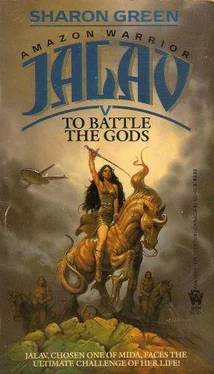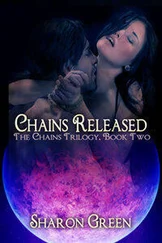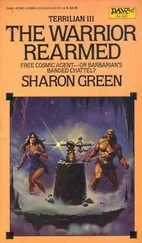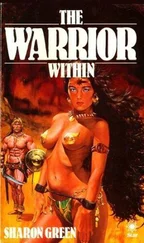Sharon Green - To Battle The Gods
Здесь есть возможность читать онлайн «Sharon Green - To Battle The Gods» весь текст электронной книги совершенно бесплатно (целиком полную версию без сокращений). В некоторых случаях можно слушать аудио, скачать через торрент в формате fb2 и присутствует краткое содержание. Жанр: Фантастические любовные романы, на английском языке. Описание произведения, (предисловие) а так же отзывы посетителей доступны на портале библиотеки ЛибКат.
- Название:To Battle The Gods
- Автор:
- Жанр:
- Год:неизвестен
- ISBN:нет данных
- Рейтинг книги:4 / 5. Голосов: 1
-
Избранное:Добавить в избранное
- Отзывы:
-
Ваша оценка:
- 80
- 1
- 2
- 3
- 4
- 5
To Battle The Gods: краткое содержание, описание и аннотация
Предлагаем к чтению аннотацию, описание, краткое содержание или предисловие (зависит от того, что написал сам автор книги «To Battle The Gods»). Если вы не нашли необходимую информацию о книге — напишите в комментариях, мы постараемся отыскать её.
To Battle The Gods — читать онлайн бесплатно полную книгу (весь текст) целиком
Ниже представлен текст книги, разбитый по страницам. Система сохранения места последней прочитанной страницы, позволяет с удобством читать онлайн бесплатно книгу «To Battle The Gods», без необходимости каждый раз заново искать на чём Вы остановились. Поставьте закладку, и сможете в любой момент перейти на страницу, на которой закончили чтение.
Интервал:
Закладка:
“Yes, you’re right,” said he, the wry look about him greatly aware of the manner in which I had stiffened. “My speech patterns are not what they were, and they sound like those used by the Feridani because—I am one of them. ”
Ceralt and Mehrayn had turned to stare upon the male as I did, the shock clanging in all of our minds, yet did the male we had known as S’Heernoh wave a hand in impatience.
“I think I should have said, ‘we come from the same culture,’ ” S’Heernoh corrected himself, and then did his face twist in disgust. “I’ve lived a long time and intend living a considerable time longer, but I’d cut my own throat right now if I ever thought I’d become like those—sickeningly warped pretenders to humanity.”
With a headshake and a sigh the male shifted his place upon the gray mist, and then did he return his eyes to me.
“It’s painful to admit, but the fault for those—monsters can be lain at the feet of no one but my people,” said he, and indeed did the admission seem painful. “We had discovered a brand-new source of energy, trans-continuum in nature—Well, let’s just say we found something new, and set up a place to study it called a pilot plant. All of the studying we’d done till then assured us that the new thing we’d found was safe to handle, but what we were doing was groping blindly around the hilt of a sword, finding it easy to hold, and assuming the rest of the weapon would be the same. We were fine as long as the hilt was all we touched—but the pilot plant wrapped a firm hand around the blade we hadn’t been able to see.
“There was a minor—explosion,” said the male, groping for the words he required. “Even the people right near the explosion weren’t seriously hurt, and we laughed with relief and congratulated ourselves, because we’d found such a safe source of energy. We didn’t know how much of a disaster we’d created until some months later, when crippled and terribly mutated babies started to be born, all within a radius of seventy-five miles of the pilot plant. The energy burst of the explosion had been less than a minute in duration—the storm flowing from our new creation had lasted less than a reckid—and yet people as far away as from Bellinard to half way to Ranistard had been hurt by it. Not so much the people themselves, but their offspring, their babies. Some were so badly twisted by the storm that they were born dead, and they were surely the lucky ones. Some were born to constant, unending agony, some to be violently allergic to the very air they needed to live—and some were born with nothing visibly wrong with them at all.
“Although we didn’t know it at first, these were the worst mutants of them all,” said the male with a sigh for remembered grief. “They seemed to be fine and they grew up just like any child, but the older they got, the more—different—they became. No very young child has a conscience, that’s something that has to be taught them, but these children were impossible to teach. No matter how old they got and what they were taught, they considered no one but themselves. It was always their comforts and their likes and their wishes which concerned them, and causing others pain and difficulty didn’t bother them in the least. When their difference was noticed and they were gathered in and studied, it was discovered that they were entirely without social awareness. What benefited them was good, what interfered with their desires wrong, and nothing we were capable of could cause them to change from so socially disastrous an outlook. In our society, just as among the clans, the one who thinks of himself or herself to the exclusion of everyone else around is a danger to that society. If there’s a fire and everyone cooperates, everyone gets out alive; if everyone were to try to save themselves alone, most if not all, would die.”
“Indeed,” said I with a nod, recalling that even children of the wild will not attack if fire roars through the forests. “Those who consider themselves above the good of the clan are quickly ended, so that they shall not give the clan more daughters like themselves.”
“We made the mistake of feeling sorry for those children,” said S’Heernoh, a weariness now touching him. “They had been given about half the education which they normally would have had, and it was decided not to let them have any more, but also to let them keep what they’d already been given. They were all put in a very large shelter, a place of great beauty where all their needs were taken care of, but where they weren’t permitted to come in contact with the rest of society. They stayed in the shelter for many years, so many that most of us forget about them, and then one morning they were gone, they and all their belongings. They had somehow gotten access to a fleet of small ships gathered for a yearly race, had killed the owners and crew of the ships, and then had taken off in different directions. We knew then that we should have killed them before allowing them to run loose among innocent, unsuspecting people, but the realization had come too late.”
“And so you now pursue them?” asked Mehrayn, clearly having followed the male’s narration. “For what reason do you not ask the aid of others, others such as the stranger folk who have recently come to us? Would their wonders not make your task more easily accomplished?”
“No,” returned S’Heernoh, yet gently, for he clearly had no intentions of giving insult. “The last thing we want to do is get involved with the people you come from, and I don’t know if I can explain why. First let me say that the biggest problem we face is that you and we seem to share a common beginning; we don’t know how that can be or even what that common beginning was, but the fact can’t be denied. We all come from the same stock—but our race is many hundreds of years—kalod—older than yours.”
We all looked upon the male with lack of comprehension, and this he seemed to expect. Vexation touched him briefly, causing him to run a hand through his hair.
“Picture—picture a full-grown warrior and a child just beginning to learn the skill of a warrior,” said he at last, again groping for the proper phrases. “As a full-grown warrior yourself, you know that the child will reach your level of skill, but first it has to grow and learn and practice. But picture that child as one who thinks it’s already fully grown, and already has all the skill there is to be had. If it sees you, so much larger and so much more skilled, its first thought might be that it will never grow to match you, no matter how long it tries, so it might as well give up even before trying. Even if the child doesn’t think that, it might decide that there’s no need for it to work hard acquiring what you already have, and might march up to you and demand to be given your skill without working for it. If you agree, you destroy that child as a warrior; something given is never as precious and meaningful as something gotten by one’s own hard work. If you refuse, the child sees nothing but the refusal, nothing but a selfishness trying to keep a skill from others, and grows sullen with resentment. That child is now your enemy, and will never forget its hatred.
“The last thing that might happen is that as soon as the child sees you, it attacks. It knows you’re larger and more skilled, and is therefore afraid of you, afraid that you’ll attack first and kill it. It doesn’t stop to find out how honorable you are, it doesn’t ask you whether you would do something that terrible, it merely assumes you would and attacks to save itself. When it finds it can’t hurt you no matter how hard it tries, it curls up in shame and total defeat, and eventually dies. ”
“So the warrior may not show itself at all to the child,” said Ceralt, his gaze unmoving from S’Heernoh, his head nodding slowly in understanding. “To protect the child, and allow it to grow to warrior size, it must be kept from knowing of the warrior.”
Читать дальшеИнтервал:
Закладка:
Похожие книги на «To Battle The Gods»
Представляем Вашему вниманию похожие книги на «To Battle The Gods» списком для выбора. Мы отобрали схожую по названию и смыслу литературу в надежде предоставить читателям больше вариантов отыскать новые, интересные, ещё непрочитанные произведения.
Обсуждение, отзывы о книге «To Battle The Gods» и просто собственные мнения читателей. Оставьте ваши комментарии, напишите, что Вы думаете о произведении, его смысле или главных героях. Укажите что конкретно понравилось, а что нет, и почему Вы так считаете.












